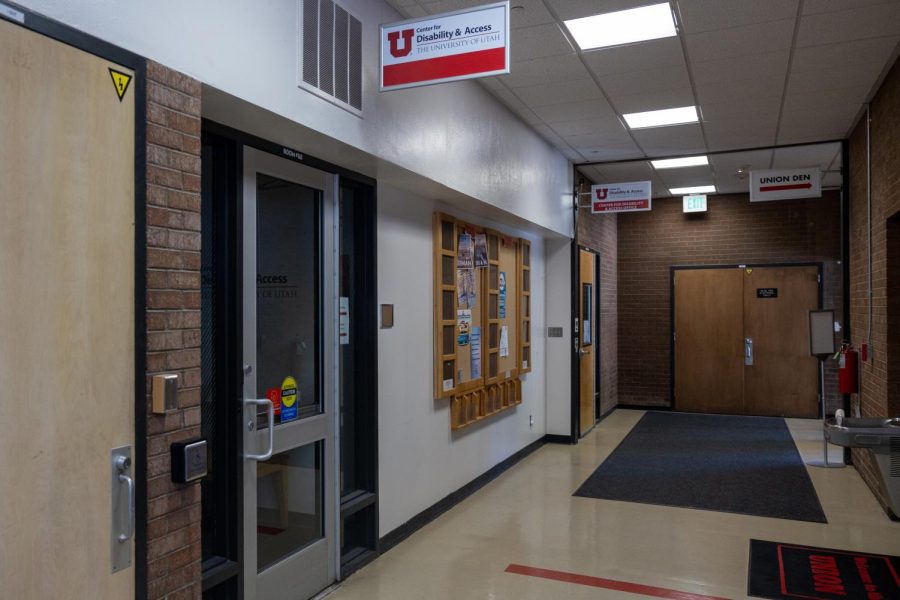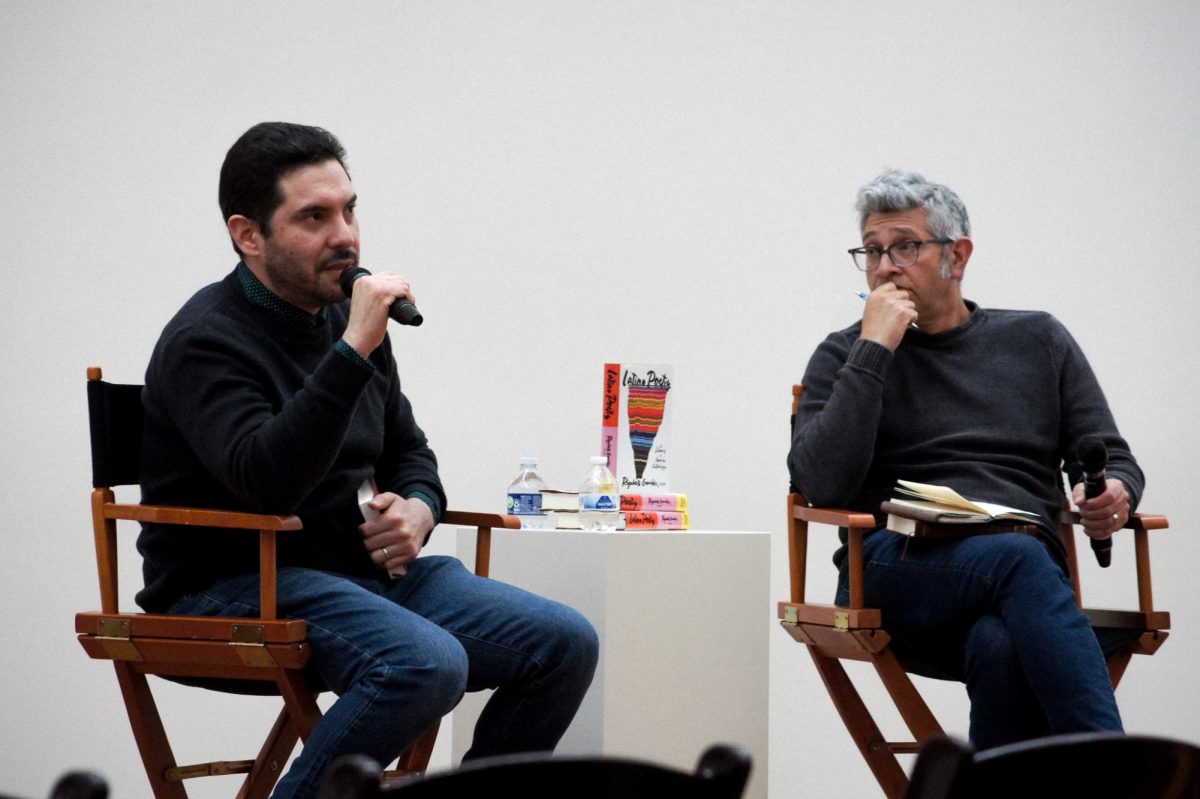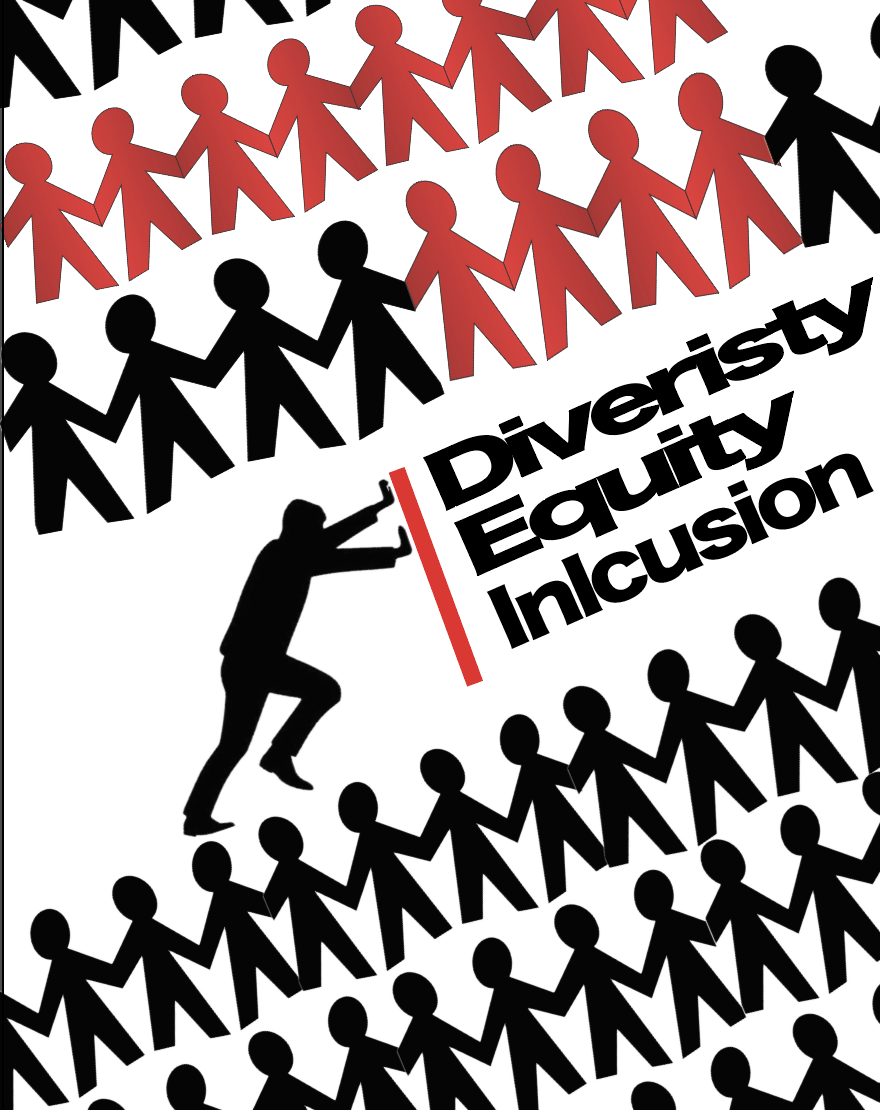Accessibility on Campus: The CDA and Student Perspectives
The Center for Disability & Access at the University of Utah on the first floor of the A. Ray Olpin Union building on campus in Salt Lake City, Utah on July 10, 2022. (Photo by Jonathan Wang | The Daily Utah Chronicle)
April 15, 2023
Before the University of Utah had a Center for Disability & Access, it had a Center for Handicapped Students that was lacking in resources. In 1977, some changes were made.
An article from the Salt Lake Tribune that year shows the U got a grant from the Utah Division of Rehabilitation Services to detect architectural barriers on campus. They hired four students with disabilities as consultants to find those barriers. In the end, one student of the four, Ila Marie Goodey, said “Life for a handicapped person at the U is a comparative piece of cake — and promises to get even better.” The question to ask nearly 50 years later is this: did the U keep its promise?
CDA Today
Today, the University of Utah’s CDA is housed on the first level of the U’s student union. It’s a small office and shares a wall with the Learning Abroad and UCard Services offices.
The director of the CDA, Christine Anderson, started in early 2023 and has been hard at work ever since. She said the CDA is comprised of a lot of moving parts that work together to provide individual students with the accommodations they need. The center offers captioning, note-takers and test accommodations, among other things, for students with disabilities. But in order to receive these services, a student has to meet with a disability advisor. These meetings are supposed to give insight into that specific student’s experience and life in an effort to better assist them.
Right now, the center has seven advisors that work individually with the 2,400 students the CDA serves. That means that each advisor is working with at least 340 students at a time.
“We definitely need more advisors, and we’re looking at the staffing and having more because, at this point, students who register with our office have dedicated advisors who care, but there’s just a lot of students and so I need more staff,” Anderson said.
It is the student’s responsibility to schedule meetings with their individual advisors. One student might want to meet with their advisor once a week, whereas others only wish to see their advisors once a semester. Anderson said another reason that time with advisors varies can be attributed to the fact that for many students, college is the first time they have had to navigate advocating for themselves as adults.
“Some students need a little bit more assistance in transitioning to adult life and in new legislation and new laws,” Anderson said. “So, they might meet with an advisor weekly. Other students have learned after a couple of years on campus, how to advocate, what resources are available, and accessing those.”
But even so, more advisors are needed. According to Anderson, hiring advisors is not a problem of finding advisors but finding the budget to pay them. She said the university administration is aware of this deficit in staffing and is working to find the budget to remedy it.
Amid the lack of funding, Anderson said the office seeks out grants for potential hires and has been somewhat successful in that pursuit. But even with the help of grants, the CDA needs more funding so that advisors will be able to work closely with individual students.
“Having an opportunity to develop even more of a therapeutic relationship with students on campus is not available as much because the advisors are working with a lot of different students in a lot of different populations,” Anderson said. “That would be my primary focus, … to hire additional advisors and have the funding to do so.”
The one question a student who prefers to remain anonymous had for the CDA was: “Why aren’t they hiring more people? Because clearly, they’re understaffed.”
When the student asked for a new advisor because their current one wasn’t able to adequately support them, they were told that was not an option. Since then, the student limits the time they spend with their disability advisor.
“In the past, I’ve tried to meet with them like once a month, and it just wasn’t really beneficial,” the student said. “So now, I pretty much only go to them when I’m having an issue. And usually, I just send them an email or a quick phone call. If that isn’t getting the job done, then I’ll go in person.”
That same student struggled to get their needed accommodations when they transitioned from high school to the U in the middle of the COVID-19 pandemic. That transition was made easier with Zoom and its closed captioning feature. But things became complicated when classes moved to in-person.
“Once everything was in person, I was having an even harder time,” they said.
Eventually, the student got the accommodation they needed: a device that transcribed their professor’s lectures so that the student would be able to go back and listen again when they needed to. This was extraordinarily helpful as the student has a processing disorder, but the social setbacks of the device proved to counteract the progress that was being made.
“People like aren’t wanting to like sit by me or talk to me or anything like that, because I’m, in their eyes, this person with all these extra things, and they just don’t know what to do with it,” the student said. “And I don’t know how to handle that because I’ve never had to before.”
While the student has been fortunate to find a group of friends that support them through their college years, those aren’t the people that they spend the majority of their day with.
“I feel like my close friends understand it, but they also aren’t the people that I’m like going to class with or anything,” they said. “So they aren’t seeing a lot of that. I think they get it. But I still think a lot of my classmates don’t get it at all. I still get questions a lot in class. I was really hoping CDA would help me find that community.”
When the student started at the U, they were told the CDA was in the process of developing an autism mentorship program through the office. The program would be a space for students with autism at the U to meet and discuss different challenges on campus. The student asked why the program never came to fruition, but wasn’t given an answer.
Instead, they were told that they could start the program instead, which the student had no interest in.
“A student organization is very different than an organization being sponsored and started by a student success advocate working with CDA who has a lot of knowledge about autism,” the student said.
When talking about potential student groups through the CDA, Anderson said, “I think it ebbs and flows, depending on what’s happening.”
The student said they think they’re one of the luckier students with a disability on campus.
“I think a lot of the reason why I’ve been successful and able to get my accommodations and all of that is because I stand up for myself and I’m privileged enough that my parents helped me stand up for myself — they’ll hop in on Zoom calls with me … beyond email chains, and help fight for what I need,” they said. “But I think if I wasn’t constantly sending emails, and like, really being like, ‘No, I’m not going to take no for an answer,’ then I wouldn’t receive a lot of my accommodations, and I wouldn’t get a lot of help that I have right now.”
Campus Today
In a survey conducted by the Chronicle, 20 respondents shared the access issues they have seen on campus today, and if they’ve seen a response from the U in their time at the school.
Three students said they have not noticed any access issues on campus.
Five students mentioned a lack of parking in their responses. One student said, “Parking is my biggest struggle. Over Christmas break, I had to have hip surgery so my mobility has been extremely limited and will be limited for the remainder of the semester. I have been disappointed to see others without handicap parking passes parking in the handicap spots, which then forces me to crutch from long distances.”
Two responses mentioned campus shuttles, including that they don’t run frequently enough and that they become “too much of a hassle for people with disabilities that they choose to avoid them,” Arden Cook said.
Two students mentioned how walking on campus can be difficult, with one referring to a lack of lighting and the other discussing getting to class on time when the rooms are at opposite ends of campus. Cook acknowledged there have been alternative ADA paths for students who need to navigate areas under construction. One student said lack of snow removal is a hazard, with stairs often having ice and snow on them.
An anonymous student mentioned destruction in their building, and that they have seen some rebuilding, but not for every part.
One student, who said they have sensory issues, said it can be difficult to pay attention in classes with loud background noise or bright lights. They gave the example of classrooms in Gardner Commons, with pipes above them that frequently make noise.
“I’ve had a professor in that building who would not allow and even shamed people for the wear of headphones or earbuds in class, despite this being something that greatly helps me to focus,” the student said. “I was unsure how to approach this professor about this issue because I felt he wouldn’t care if headphones help me focus. I found myself struggling daily to pay attention in his class and ended up skipping it once or twice simply because I couldn’t bring myself to sit through that amount of pain again. I passed his class and hated every minute of it.”
One student, Greta Low, said the hills are too steep to push a manual wheelchair up.
“The CDA is difficult to work with and denies accommodations while refusing to provide a reason for the denial,” Low said. “The elevators are old and break down. The buttons to automatically open doors rarely work.”
Low said professors, however, have made sure their classes are accessible.
Four other students mentioned professors in their responses, with one student saying, “Professors who don’t understand disability (especially invisible disabilities and chronic illness) act as if I am faking and refuse to accommodate.”
Another student said, “Most professors don’t seem to be very knowledgeable on the workings of the Center for Disability & Access. While I haven’t had any conflicts in professors refusing accommodations for me, I do often have to meet with them after class to explain to them what needs to be done before I would be able to take an exam for their class. It would be nice if professors, once they are made aware of a student with disability accommodations in their class, would be informed by the CDA on what will be needed from them so the student themselves doesn’t have to do it.”
This same student said the CDA portal has improved for both students and instructors in just a year’s time.
“For professors who understand what they’re meant to do, the portal seems to have made things easier for them when uploading exam times,” the student said.
One student said student mental health is “brushed under the rug and ignored,” professors are rude and there is not enough variety in scheduling options for courses.
“Accessibility applies to more than just physical disabilities,” another student, Kayli Torres, said. “Some disabilities aren’t visible or noticed, and teachers here at the U need to understand that and be more kind with their students who need that understanding from them.”
According to Torres, “The accessibility clause in every syllabus was powerful when I first heard it but now I know that [the] majority of my teachers don’t actually know what it means, don’t care about it (it’s just another thing to check off the list), and they don’t know how to handle accessibility issues in their own classroom.”












